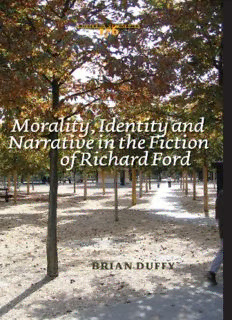
Morality, Identity and Narrative in the Fiction of Richard Ford. (Costerus NS, 176) PDF
Preview Morality, Identity and Narrative in the Fiction of Richard Ford. (Costerus NS, 176)
Morality, Identity and Narrative in the Fiction of Richard Ford Costerus New series 176 Series Editors: C.C. Barfoot, Theo D’haen and Erik Kooper Morality, Identity and Narrative in the Fiction of Richard Ford Brian Duffy Amsterdam-New York, NY 2008 Cover photo: Le Jardin du Luxembourg, Paris. By Brigitte Le Juez Cover design: Aart Jan Bergshoeff The paper on which this book is printed meets the requirements of “ISO 9706:1994, Information and documentation - Paper for documents - Requirements for permanence”. ISBN: 978-90-420-2409-0 ©Editions Rodopi B.V., Amsterdam - New York, NY 2008 Printed in the Netherlands ACKNOWLEDGEMENTS Most of this book was written during a year’s sabbatical leave in 2006. I am grateful to Dublin City University for granting me this research time, but particularly to the School of Applied Language and Intercultural Studies in DCU. I would also like to acknowledge the travel grant I received from the Research Travel Programme of DCU’s Faculty of Humanities and Social Sciences, which allowed me to travel to the United States to interview Richard Ford. I am very grateful to my editor, Cedric Barfoot, for his meticulous editing and advice; his experience and guidance were invaluable to me throughout the editing of the manuscript. And I would also like to thank Esther Roth of Rodopi for her patience and assistance during the latter stages of bringing the book to publication. I greatly appreciated, too, the technical assistance of Shelly Barron in DCU. There are, of course, personal debts that I am glad to be able to acknowledge. The reader’s gratitude I felt towards Richard Ford took a more personal form when I had the opportunity to meet him and, later, to interview him. In all my contacts with him he has been courteous, attentive and exceptionally obliging in his responses. And my gratitude for this easy personal contact extends fully to Kristina Ford. Both of them welcomed me warmly into their home, where the interview with Richard Ford was conducted, a generosity that has extended well beyond the professional business of this book I am grateful to Douglas Smith for his encouragement, and to my colleague Marnie Holborow for her support over a number of years. This book is dedicated to Brigitte Le Juez, the person to whom I owe most. CONTENTS Introduction 9 1. The Sportswriter I: Fleeing the Past 17 2. The Sportswriter II: Impermanence and the Present 35 3. Independence Day I: From Unity to Fragmentation 59 4. Independence Day II: Laissez-faire and Isolation 83 5. The Lay of the Land I: America Divided 113 6. The Lay of the Land II: The Return of the Past 141 7. “The Womanizer”: Identity and the Good 175 8. “Occidentals”: Americans in Paris 205 9. A Multitude of Sins: Acts and Consequences 231 10. “Calling”: The Narrative Cure 245 11. “Reunion”: Time and Narrative 259 12. “Charity”: Marriage and Identity 273 13. “Abyss”: The Fall 293 Conclusion 313 Interview with Richard Ford 321 Bibliography 359 Index 363 INTRODUCTION Since the publication of The Sportswriter in 1986 Richard Ford has been recognized as one of America’s leading writers of fiction. He has been awarded the Pulitzer Prize, the PEN/Faulkner Award and the PEN/Malamud Award for short fiction. His work has been celebrated by critics and fellow writers alike, and he has won the loyalty of a large and international readership. Yet, for such an important writer, there is relatively little scholarly work available on his novels and stories. At the time of writing, only three books devoted exclusively to his work have been published (a monograph, a book of essays and a collection of interviews), along with a limited number of articles in academic publications. The relative scarcity of scholarly work leaves Richard Ford’s fiction seriously under-researched, not only in terms of general commentary but also with respect to important recurring themes in his writing. A new book on Ford’s fiction, then, might hope to have a small contribution to make. Richard Ford is most immediately identified with the trilogy of novels devoted to his character, Frank Bascombe. One of the objectives of this book is to provide a wide-ranging and integrated commentary on the trilogy, recently completed with the publication of The Lay of the Land (October 2006). Why “wide-ranging”? The Frank Bascombe novels are long novels, each successive book longer than its predecessor, with the final one not far short of five-hundred pages. The novels present us with a man and a nation, and take their leisurely time to explore both at three different moments, two in the 1980s and, finally, in the year 2000. Character and country are examined from a variety of perspectives. Frank features in his various roles as ex- husband, father (of two living children and one dead child), divorcee, lover, husband, abandoned husband, friend, sportswriter, real estate agent, suburbanite, citizen and, in the role that gives his narrative voice its great distinctiveness, inveterate philosopher of his own life. Frank’s life is, in exemplary fashion, the examined life. But Frank, as first-person narrator, also turns his inquiring mind to his country, and delivers himself of a rich stream of opinions on contemporary America, be it the experience of living in the suburbs, the influence of
Description: